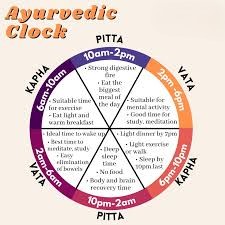In Ayurveda and Diet philosophy, food is not just fuel — it is medicine. What, when, and how you eat can either nourish your body or create imbalances. This ancient system emphasizes choosing foods that align with your body’s natural rhythms, dosha type, and digestive strength to support true wellness.
In this guide, we’ll explore the core principles of Ayurvedic diet, including what to eat, what to avoid, food combining rules, meal timings, and powerful superfoods you can include daily.
🍽️ Ayurvedic Principles of Eating
1. Eat According to Agni (Digestive Fire)
Ayurveda believes in the concept of Agni, your digestive fire. When Agni is strong, food is digested properly. When weak, toxins (ama) build up.
Tips to support Agni:
- Eat only when hungry
- Avoid overeating
- Drink warm water throughout the day
2. Eat Fresh, Seasonal, and Cooked Foods
Avoid frozen, canned, or heavily processed items. Favor:
- Fresh vegetables
- Seasonal fruits
- Warm, home-cooked meals
These are easier to digest and support the body’s natural healing process.
3. Sit Down and Eat Mindfully
Ayurveda recommends:
- Eating in a quiet, calm space
- Avoiding screens or talking too much while eating
- Chewing thoroughly
This supports mental digestion along with physical digestion.
❌ Foods to Avoid in Ayurveda
Some modern food habits go against Ayurvedic wisdom. The following should be limited or avoided:
- Cold and raw foods (especially salads, cold drinks)
- Fermented and leftover food
- Canned, reheated, or microwaved meals
- Overly spicy, salty, or fried foods
- Heavy dairy combinations like milk + fruit
- Non-vegetarian food for certain constitutions
🍓 Ayurvedic Superfoods You Can Eat Daily
- Amla (Indian Gooseberry) – Rich in Vitamin C, supports immunity and digestion.
- Ghee – Boosts digestion, nourishes tissues, and lubricates joints.
- Turmeric – Anti-inflammatory, supports liver and skin health.
- Ashwagandha – Builds stamina, reduces stress.
- Triphala – Detoxifies the colon and aids elimination.
- Mung dal – Light, protein-rich, and easy to digest.
These superfoods are suitable for most body types and provide deep nourishment.
🍴 Meal Timing in Ayurveda
According to Ayurvedic circadian rhythm:
| Meal | Best Time | Why |
|---|---|---|
| Breakfast | 7:00 – 9:00 AM | Boost energy gently |
| Lunch | 12:00 – 1:30 PM | Digestive fire is strongest |
| Dinner | 6:00 – 7:30 PM | Early dinner supports detox |
| No late-night eating | ❌ After 8:00 PM | Leads to toxin buildup |
🔗 Ayurvedic Food Combining Rules
Food combinations can either support or harm digestion.
Avoid these combos:
- Milk + citrus fruits
- Milk + bananas
- Yogurt + fish
- Ghee + honey (in equal quantity)
- Fruit + cooked food
Better combinations:
- Rice + dal
- Ghee + steamed vegetables
- Turmeric + milk (Golden milk)
✅ Quick Ayurveda Daily Diet Plan (Tridosha-friendly)
Morning:
- Warm water with lemon
- Cooked apples or soaked almonds
Lunch:
- Rice, dal, sautéed seasonal veggies
- Buttermilk
Evening Snack:
- Herbal tea (ginger, tulsi)
Dinner:
- Moong dal soup or khichdi
- Light steamed veggies
Diet According to Your Dosha Type
Ayurveda and Diet are deeply connected, viewing food as a powerful tool for healing and balance. What, when, and how you eat can either nourish your body or create imbalances. Food in Ayurveda is more than nutrition — it’s vibrational medicine. By following Ayurvedic dietary principles like mindful eating, seasonal foods, and avoiding incompatible combinations, you support your body’s natural intelligence and digestion. While some Ayurvedic foods are tridoshic (beneficial for all body types), Ayurveda shines when you eat according to your individual constitution, or Prakriti. Here’s how diet should vary based on your dominant dosha:
🌬️ Vata Dosha Diet (Air & Ether)
Vata Traits: Light, dry, cold, irregular digestion, creative but anxious. Vata Doshas Daily Routine
Ideal Foods:
- Warm, cooked meals like khichdi, soups, porridges
- Healthy fats like ghee, sesame oil, and avocados
- Root vegetables, rice, oats, soaked nuts
- Warm milk with turmeric or ashwagandha
Avoid:
- Cold foods, raw salads, carbonated drinks
- Dry snacks, fasts, and skipping meals
- Beans (unless well-cooked with spices)
🔥 Pitta Dosha Diet (Fire & Water)
Pitta Traits: Hot, sharp, intense, fast digestion, prone to acidity or anger. Pitta Doshas Daily Routine
Ideal Foods:
- Cooling and calming foods like coconut, cucumber, mint, and sweet fruits
- Grains like barley, rice, and wheat
- Dairy (milk, ghee, buttermilk in moderation)
- Herbs like coriander, fennel, and licorice
Avoid:
- Spicy, fried, fermented foods
- Coffee, alcohol, sour fruits (lemon, tamarind)
- Onions, garlic, tomatoes in excess
🌍 Kapha Dosha Diet (Earth & Water)
Kapha Traits: Heavy, slow, steady, prone to weight gain and congestion. Kapha Dosha Daily Routine
Ideal Foods:
- Light, dry, and warm meals
- Spices like ginger, black pepper, turmeric, cinnamon
- Legumes, leafy greens, millet, apples
- Herbal teas (like trikatu, tulsi)
Avoid:
- Dairy, fried food, sweets, and cold drinks
- Excessive oily foods
- Heavy grains like wheat and rice in large quantity

🧭 Not Sure About Your Dosha?
You can link users to a dosha quiz or consultation section:
📌 Talk to Our Ayurvedic Experts to find out your body constitution.
🧘 Final Thoughts
In the practice of Ayurveda and Diet, every bite is considered a step toward health or imbalance. By following Ayurvedic dietary principles like proper food combining, seasonal eating, mindful consumption, and avoiding incompatible foods, you support your body’s natural intelligence.
Start small. Even one Ayurvedic meal a day can begin to shift your energy and well-being.


